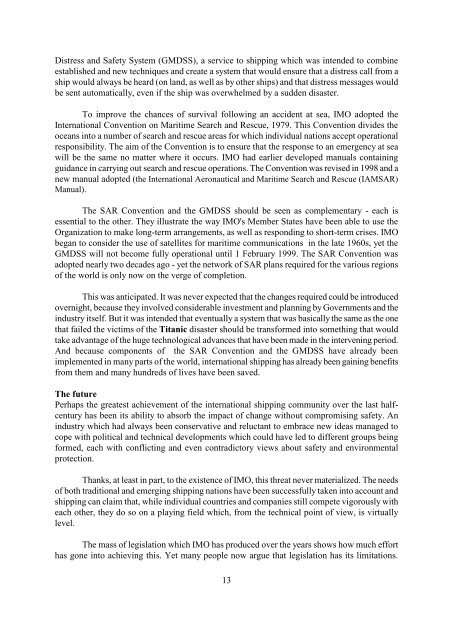wmd 1998 background document.pdf - IMO
wmd 1998 background document.pdf - IMO
wmd 1998 background document.pdf - IMO
Create successful ePaper yourself
Turn your PDF publications into a flip-book with our unique Google optimized e-Paper software.
Distress and Safety System (GMDSS), a service to shipping which was intended to combine<br />
established and new techniques and create a system that would ensure that a distress call from a<br />
ship would always be heard (on land, as well as by other ships) and that distress messages would<br />
be sent automatically, even if the ship was overwhelmed by a sudden disaster.<br />
To improve the chances of survival following an accident at sea, <strong>IMO</strong> adopted the<br />
International Convention on Maritime Search and Rescue, 1979. This Convention divides the<br />
oceans into a number of search and rescue areas for which individual nations accept operational<br />
responsibility. The aim of the Convention is to ensure that the response to an emergency at sea<br />
will be the same no matter where it occurs. <strong>IMO</strong> had earlier developed manuals containing<br />
guidance in carrying out search and rescue operations. The Convention was revised in <strong>1998</strong> and a<br />
new manual adopted (the International Aeronautical and Maritime Search and Rescue (IAMSAR)<br />
Manual).<br />
The SAR Convention and the GMDSS should be seen as complementary - each is<br />
essential to the other. They illustrate the way <strong>IMO</strong>'s Member States have been able to use the<br />
Organization to make long-term arrangements, as well as responding to short-term crises. <strong>IMO</strong><br />
began to consider the use of satellites for maritime communications in the late 1960s, yet the<br />
GMDSS will not become fully operational until 1 February 1999. The SAR Convention was<br />
adopted nearly two decades ago - yet the network of SAR plans required for the various regions<br />
of the world is only now on the verge of completion.<br />
This was anticipated. It was never expected that the changes required could be introduced<br />
overnight, because they involved considerable investment and planning by Governments and the<br />
industry itself. But it was intended that eventually a system that was basically the same as the one<br />
that failed the victims of the Titanic disaster should be transformed into something that would<br />
take advantage of the huge technological advances that have been made in the intervening period.<br />
And because components of the SAR Convention and the GMDSS have already been<br />
implemented in many parts of the world, international shipping has already been gaining benefits<br />
from them and many hundreds of lives have been saved.<br />
The future<br />
Perhaps the greatest achievement of the international shipping community over the last halfcentury<br />
has been its ability to absorb the impact of change without compromising safety. An<br />
industry which had always been conservative and reluctant to embrace new ideas managed to<br />
cope with political and technical developments which could have led to different groups being<br />
formed, each with conflicting and even contradictory views about safety and environmental<br />
protection.<br />
Thanks, at least in part, to the existence of <strong>IMO</strong>, this threat never materialized. The needs<br />
of both traditional and emerging shipping nations have been successfully taken into account and<br />
shipping can claim that, while individual countries and companies still compete vigorously with<br />
each other, they do so on a playing field which, from the technical point of view, is virtually<br />
level.<br />
The mass of legislation which <strong>IMO</strong> has produced over the years shows how much effort<br />
has gone into achieving this. Yet many people now argue that legislation has its limitations.<br />
13
















